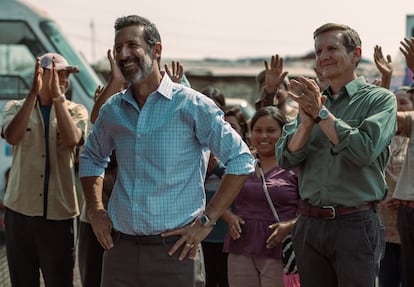‘The Gringo Hunters,’ a Mexican border police unit that deports criminals back to the United States
The Netflix series, which premieres on July 9, is inspired by the work of the Tijuana International Liaison Unit, which pursues fugitives from the US who escape to Mexico in search of impunity


Since Donald Trump’s rise to power, the criminalization of irregular immigration has become a constant. U.S. Immigration and Customs Enforcement has dedicated itself to pursuing, arresting, and deporting the undocumented Latino community, many of them innocent, without due process. What if there were an alternate reality? One in which a Baja California police unit is dedicated to “arresting and deporting white men” with a proven criminal record back north of the border. Their job is exclusively to hunt down American criminals, or “bad hombres” — as the Republican would have said — who flee to Mexico in search of impunity. This unit exists and is officially called the International Liaison Unit, or, more colloquially, the gringo hunters. Netflix is using this name for its new production, inspired by true events, which premieres on July 9.
This new series takes the action genre, combined with drama, suspense, and police procedural, to adapt The Washington Post report by Kevin Sieff. Rafael Ley, one of the producers, admits that it was a story that created a lot of noise and, in an industry always looking for something new to tell, it didn’t pass unnoticed.
“One of the things that caught our attention most is this cliché or idea that Mexico can be a lawless land, where you can escape if you’ve committed a crime. It’s interesting that there’s this team that proves otherwise and is dedicated to capturing them and returning them to face the consequences of their crimes,” says Stacy Perskie, another producer on the series, via video call.

The synopsis for Netflix’s new television series places viewers in a time when the Nueva Tijuana project is being pushed by a group of local businesspeople and politicians to make the city a more attractive destination for everyone. Amid this, the gringo hunters try to solve a key case that compromises the security of their operation, while continuing their work of returning criminals who try to evade justice by hiding in Mexico to the United States.
The cast that plays the police unit, composed of Harold Torres, Mayra Hermosillo, Manuel Masalva, Andrew Leland Rogers, Héctor Kotsifakis, Regina Nava and Dagoberto Gama, was able to meet the real gringo hunters in a process that, between writing the script, producing and filming, took around two years to complete.
“Kevin Sieff was very involved in the development of the series throughout. He helped us with the initial contact, and we subsequently hired a specialized research team to help us find narrative lines for the series,” Ley explains.
Since there aren’t many examples of procedural dramas in Latin America — a genre of programs or stories that focus on the investigation of a specific crime or problem — the producers found inspiration for the series’ tone in the crime film saga Lethal Weapon, which starred Mel Gibson and Danny Glover. “We wanted to do something much more cinematic. We felt Lethal Weapon had this fun approach to breaking up dangerous situations while also telling a story involving great adventures for the characters,” Perskie explains.
In Sieff’s report, the narrative follows descriptions of individual cases that the gringo hunters have faced, while also elaborating on an ongoing police situation they are currently dealing with. Ley and Perskie say that these stories, broken down in the journalistic text, were indeed a source of inspiration due to the “sense of realism” they tried to instill in the production, but that they didn’t adhere to anything strictly.
“Above all, we were very interested in focusing on the dynamics of our main characters. That’s why we have these actors who are super-charismatic, and we wanted the audience to empathize with them. This isn’t about exposing a real case or anything like that, but rather about how they [the police unit] work,” Ley clarifies.
“Here begins the homeland”
According to Sieff’s article, published in 2022, the unit captures an average of 13 Americans per month. Since its creation in 2002, it has apprehended more than 1,600. “Many of these suspects were inspired by one of America’s oldest clichés: the troubled outlaw who ventures into sepia-toned Mexico hoping to disappear forever,” the American journalist says of the profile of criminals captured by the gringo hunters.
Tijuana also plays an important role, almost like an inherent character in the plot. “It was incredibly important how we captured the essence of Tijuana and placed it on screen,” Ley explains. The producers sought to emphasize the city through the phrase “Here begins the homeland,” which has significant symbolic significance for Mexico.
It’s a motto, Perskie explains, that reflects local pride and the importance of this city as the gateway to Mexico: “We feel that Tijuana hasn’t been represented enough in film and television in recent years. It has an impressive wealth, and what happens there is also very interesting because of the border situation and the cultural exchange that occurs with only a wall in between.”
One of the challenges the series set for itself was to set a standard, within the action genre, for what it means to work for an elite police force and for this to be conveyed to an audience as if they were watching something that actually resembles real life. “There are some pretty high-level action sequences. The action genre hasn’t been widely explored, and we’re really excited to have the opportunity to do that. We feel there’s an appetite for this type of genre, for these types of stories. Recently, the film Counterattack, which also came out on Netflix, had a great response. So, we’re excited to explore this genre,” Perskie concludes.
Sign up for our weekly newsletter to get more English-language news coverage from EL PAÍS USA Edition
Tu suscripción se está usando en otro dispositivo
¿Quieres añadir otro usuario a tu suscripción?
Si continúas leyendo en este dispositivo, no se podrá leer en el otro.
FlechaTu suscripción se está usando en otro dispositivo y solo puedes acceder a EL PAÍS desde un dispositivo a la vez.
Si quieres compartir tu cuenta, cambia tu suscripción a la modalidad Premium, así podrás añadir otro usuario. Cada uno accederá con su propia cuenta de email, lo que os permitirá personalizar vuestra experiencia en EL PAÍS.
¿Tienes una suscripción de empresa? Accede aquí para contratar más cuentas.
En el caso de no saber quién está usando tu cuenta, te recomendamos cambiar tu contraseña aquí.
Si decides continuar compartiendo tu cuenta, este mensaje se mostrará en tu dispositivo y en el de la otra persona que está usando tu cuenta de forma indefinida, afectando a tu experiencia de lectura. Puedes consultar aquí los términos y condiciones de la suscripción digital.








































